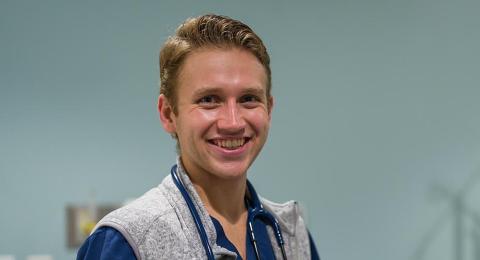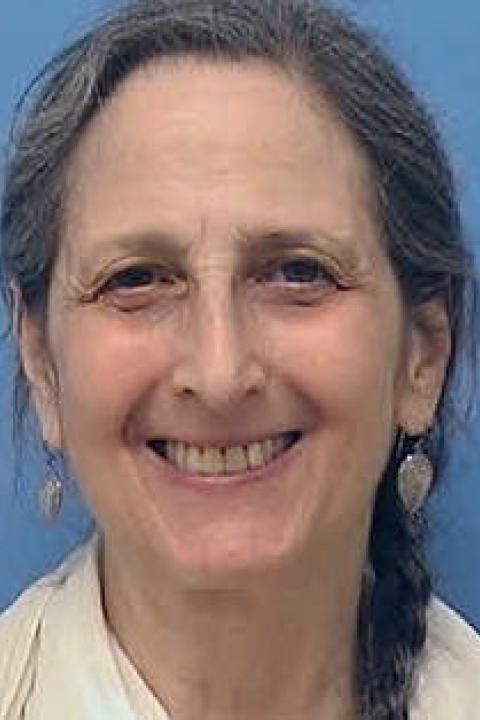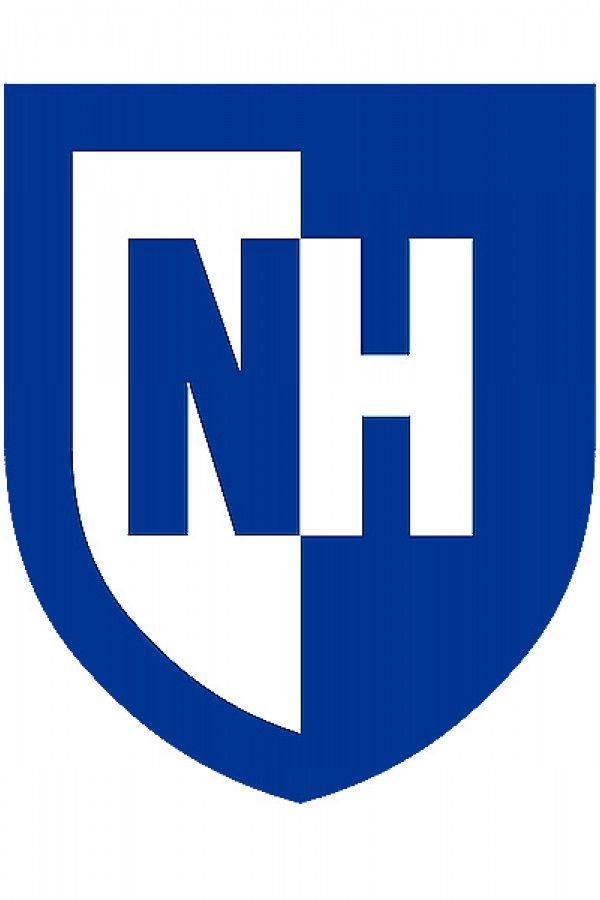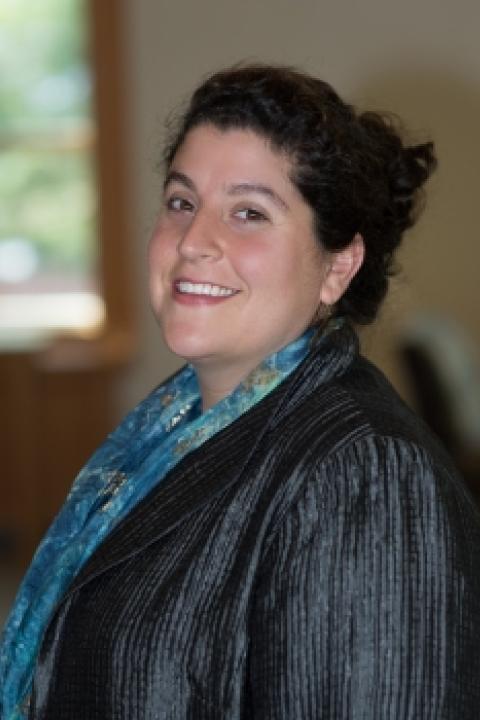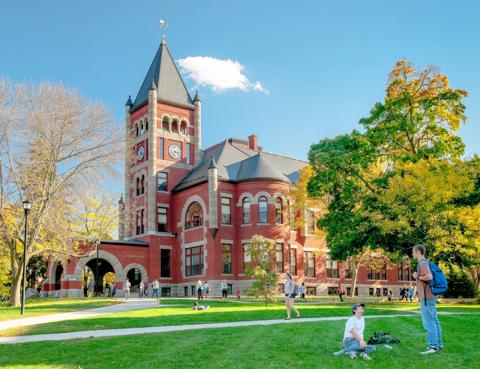Why get a Direct Entry Nursing Master's degree?
Whether you’re looking for a change or to advance your career, our Direct Entry Master of Nursing (DEMN) program will help you pursue advanced-practice nursing qualifications without a prior bachelor’s or graduate degree in the field. This program will prepare you for a career as a Registered Nurse providing direct patient care and the ability to manage and solve complex patient problems in a range of healthcare settings. You’ll work directly with clinicians to help manage the delivery of patient care, including the development and implementation of treatment plans and the evaluation of their success. This program offers the clinical nurse leader (CNL) track, which will also prepare you for clinical leadership roles in your new career.
Why choose UNH's Direct Entry Master's in Nursing program?
The direct entry master of nursing is completed in just five semesters, including two summer sessions. You’ll be eligible to take the NCLEX-RN examination after your fourth semester which is necessary for licensure as a Registered Nurse. In your final semester, you’ll sit for the American Association of Colleges of Nursing (AACN) national Clinical Nurse Leader exam, allowing you to graduate with both a master’s degree and your CNL certification. You’ll complete an immersion experience of approximately 300 clinical hours, followed by a capstone experience for an additional 300 hours for CNL certification eligibility, gaining valuable hands-on experience in the field.
Potential Career Areas
- Registered Nurse in Acute Care Facilities
- Clinical nurse leader (CNL)
- Community and public health facilities
- Education
- Healthcare administration
- Home healthcare services
- Outpatient care
- Research
From the CHHS Blog
Curriculum & Requirements
The Direct Entry Master’s in Nursing Program is a full-time, five-semester, program of study designed for non-RN students who hold a B.S. or B.A. or higher degree in a field other than nursing and desire a career changes into the nursing profession. This program will prepare you for a career as a Registered Nurse providing direct patient care and the ability to manage and solve complex patient problems in a range of healthcare settings. The curriculum begins in January and includes two summer sessions. You’ll be eligible to take the NCLEX-RN examination after your fourth semester which is necessary for licensure as a Registered Nurse.
Students graduate as an advanced generalist with a master of science (MS) degree in nursing. This program offers the American Association of Colleges of Nursing (AACN) Clinical Nurse Leader (CNL) track. The CNL is a role in the field of nursing designed to provide master's-prepared, point-of-care nurse leaders with the ability to manage and solve complex patient problems within a systems framework. and upon passing certification examination, as a clinical nurse leader (CNL). Students take the CNL certification examination in their final semester. Students complete a clinical immersion experience in clinical nursing leadership, which includes 300 clinical hours.
Students are eligible to take the NCLEX-RN after completing a total of 57 credits of accelerated study. Students conclude their CNL master's preparation with a clinical nurse leader capstone course, which includes a project and 200 clinical hours and take the CNL certification examination in the final semester.
Admission Requirements
A grade point average of 3.0 or better is suggested. Previous course work and professional experience is taken into consideration. Experience in health care is not required. Prerequisite courses include Human Anatomy & Physiology I and II with lab, Microbiology at the cellular level, and Statistics with a grade of B or better. Students who have not completed all prerequisite courses at the time of application may be admitted with the stipulation that all prerequisite courses are completed with a B or better prior to starting the program.
Knowledge of the basic processes and methods of research is necessary for students entering the DEMN program. While many undergraduate programs include a research methods course, if a student does not have a background in research, he or she should enroll in an introductory research course or introductory nursing research textbooks may be used as self-study resources prior to matriculation in the DEMN program.
Three letters of recommendation are required. Professional references should be substantial, one academic reference is highly recommended. Letters of recommendation from family or friends are not acceptable.
Degree Requirements
Students complete 63 total credits.
Clinical Hours: 860*
| Code | Title | Credits |
|---|---|---|
| Required Courses | ||
| NURS 801 | Health Policy and Nursing Practice | 3 |
| NURS 807 | Pathophysiology and Pharmacology | 4 |
| NURS 811 | Clinical Reasoning Through Simulation | 2 |
| NURS 813 | Health Assessment and Clinical Nursing Theory | 4 |
| NURS 813C | Health Assessment and Clinical Nursing (90 clinical hours) | 2 |
| NURS 822 | Chronic Disease Management | 3 |
| NURS 826 | Caring for People with Severe and Persistent Mental Illness | 2 |
| NURS 826C | Caring for People with Severe and Persistent Mental Illness Clinical (90 clinical hours) | 2 |
| NURS 827 | Managing Acute and Complex Care of Individuals | 4 |
| NURS 827C | Managing Acute and Complex Care of Individuals Clinical (90 clinical hours) | 2 |
| NURS 831 | Childbearing and Childrearing Families | 2 |
| NURS 831C | Childbearing and Childrearing Families Clinical (90 clinical hours) | 2 |
| NURS 835 | Leadership in Healthcare | 3 |
| NURS 844 | Population Health | 3 |
| NURS 902 | Advanced Physical Assessment | 2 |
| NURS 908 | Advanced Physiology & Pathophysiology Across the Lifespan | 3 |
| NURS 952 | Clinical Nursing Leadership | 2 |
| NURS 952C | Clinical Nursing Leadership Clinical (300 clinical hours) | 6 |
| NURS 953 | Promoting Quality Management | 3 |
| NURS 958 | Clinical Nurse Leader Capstone (project plus 200 clinical hours) | 6 |
| NURS 968 | Foundations of Evidence Based Practice | 3 |
| Total Credits | 63 | |
- *
Clinical hours are completed through the following required courses: NURS 813C, NURS 826C, NURS 827C, NURS 831C,NURS 952C, and NURS 958
Accelerated Master's Overview
Accelerated Master’s programs offer qualified University of New Hampshire undergraduate students the opportunity to begin graduate coursework in select graduate programs while completing a bachelor’s degree. Accelerated master's programs are designed to provide students with an efficient and cost-effective pathway to earn both a bachelor's and master's degree or graduate certificate, enhancing career opportunities and long-term earning potential.
Accelerated Master's Highlights
- Begin studying advanced topics while an undergraduate student with the opportunity to complete a master’s degree or graduate certificate early.
- Master’s degree program students: Earn up to 12* graduate (800-level) course credits while completing a bachelor’s degree. This coursework will count as dual-credit toward both the bachelor’s and master’s degrees.
- Graduate certificate program students: Earn up to 8* graduate (800-level) course credits while completing a bachelor’s degree. This coursework will count as dual-credit toward both the bachelor’s degree and the graduate certificate.
- Students complete the bachelor’s degree, and then officially matriculate into the master’s or graduate certificate program to complete the remaining required graduate-level coursework.
*Some exceptions apply.
Accelerated Master's Admission Requirements
- A minimum 3.2 cumulative GPA is required.*
- A minimum of 90 undergraduate credits must be completed prior to enrolling in graduate (800-level) courses.
- Streamlined Graduate School Application (two letters of recommendation; most standardized tests and application fee are waived).*
*Some exceptions apply.
Accelerated Master's Requirements
- Students must attend a mandatory orientation session.
- Students must submit a special registration form each semester for dual-credit courses and note any DegreeWorks exceptions.
- Students may defer graduate matriculation for up to one year after earning their bachelor’s degree in most programs.
- See the Accelerated Master’s Catalog Policy and Accelerated Master’s Website for additional information and a list of programs. Note that some programs have additional requirements (e.g. higher-grade expectations) compared to the general policy.
Nursing: Direct Entry (M.S.) Accelerated Option
| Code | Title | Credits |
|---|---|---|
| Students select from the following approved 800-level courses that can be completed in the undergraduate senior year for dual credit: | ||
| NURS 801 | Health Policy and Nursing Practice | 3 |
| NURS 807 | Pathophysiology and Pharmacology | 4 |
| NURS 813 | Health Assessment and Clinical Nursing Theory | 4 |
| NURS 813C | Health Assessment and Clinical Nursing | 2 |
Additional Information
The Direct Entry Master's in Nursing Program provides an opportunity for accelerated admission to the graduate program for full time undergraduate UNH students who are not current nursing students and meet admission criteria. Students may apply during their junior year by the posted application deadline. Application review continues until all seats are filled. To be considered, undergraduate students must have completed all major requirements by their final semester of their senior year with an anticipated December degree conferral. Direct entry courses taken during their final semester of their undergraduate program will fulfill elective credits to complete B.A./B.S. degree requirements at UNH. A maximum of 13 credits can be taken by the Accelerated Masters student for dual credit.
A grade point average of 3.2 or better is required. Previous course work is taken into consideration. Prerequisite courses include Human Anatomy & Physiology I and II with lab, Microbiology at the cellular level, and Statistics with a grade of B or better. Students who have not completed all prerequisite courses at the time of application may be admitted with the stipulation that all prerequisite courses are completed with a B or better prior to starting the program.
Applicants are strongly encouraged to meet with the Direct Entry Masters of Nursing (DEMN) Program Director and their discipline-specific adviser early on in their undergraduate program to plan this course of study.
Program Learning Outcomes
At the completion of the Direct Entry Masters in Nursing program, the student is prepared to:
- Apply knowledge from liberal arts and sciences to deliver safe, competent, and compassionate care to diverse patients, families, and communities (Level I) as well as integrate, translate, and apply knowledge from nursing and other disciplines, to formulate clinical judgment and innovation in nursing practice (Level II).
- Provide holistic, individualized, and evidence-based person and family centered care across the lifespan while advocating for social justice and equity in health care accessibility and quality (Level I) as well as design person-centered care that builds on a scientific body of knowledge focusing on individuals with multiple complicated circumstances, including family and/or important others (Level II).
- Engage in collaborative activities with community partners to advocate for equity and justice to improve health-related social needs and enhance population health (Level I) as well as advocate for healthcare delivery from public health prevention to disease management through collaborative activities for equitable population health outcomes (Level II).
- Utilize scholarly inquiry to inform best practices and compile evidence to address health-related problems across the healthcare system (Level I) as well as disseminate nursing knowledge to improve health care (Level II).
- Apply quality improvement science, to identify safety concerns and engage in risk mitigation strategies to improve patient care outcomes (Level I) as well as integrate established and emerging principles of safety as core nursing values to enhance quality and minimize harm to patients and providers (Level II).
- Collaborate within multidisciplinary care teams, through effective communication and mutual respect, that enhances the quality of healthcare services and their delivery (Level I) as well as lead collaborative care teams to optimize patient outcomes and improve health care experiences (Level II).
- Identify resources, across transitions of care in ever-changing healthcare systems, applying knowledge of cost-effectiveness and health policies to deliver equitable care (Level I) as well as coordinate resources for diverse populations to provide safe, quality, and equitable care (Level II).
- Utilize healthcare technologies and informatics processes to inform the provision of safe and effective care and support meaningful changes in nursing practice (Level I) as well as utilize informatics and communication technologies in developing and delivering optimal healthcare services according to best practice and professional and regulatory standards (Level II).
- Demonstrate a professional nursing identity marked by integrity, curiosity, civility, inclusion, and ethical practice (Level I) as well as cultivate a sustainable professional nursing identity that reflects nursing’s characteristics and values (Level II).
- Participate in self-reflection to foster personal resilience and well-being and embracing lifelong learning to develop nursing expertise (Level I) as well as utilize leadership skills, change theories, and effective decision making in advanced nursing roles in the provision of care.
Professional Licensure/Certification Disclosures
The University of New Hampshire offers a number of academic programs designed to lead to professional licensure or certification in New Hampshire. However, completing a UNH degree/program does not guarantee professional licensure or certification. Eligibility may also depend on factors like years of work experience, professional examinations, passing a background check, and other criteria.
UNH does not guarantee that its professional licensure programs will satisfy the criteria of professional licensure boards in other states. Some states maintain different requirements for professional licensure or certification and requirements can change frequently. Federal regulations require the University to make public disclosure of certain information regarding professional licensure or certification programs, regardless of the modality the program is offered (i.e., in-person or online). The University provides guidance below but recommends students contact their state/territory licensing or certification board to ensure a program meets specific state/territory requirements.
Visit the Office of the Registrar's website for information about whether this program meets professional licensure requirements in your state.
Deadlines
Applications must be completed by the following deadlines in order to be reviewed for admission:
- Fall: Recommended August 1, Final Deadline if space available December 1
- Spring: N/A
- Summer: N/A
- Special: N/A
Application fee: $65
Campus: Durham
New England Regional: CT VT RI MA
Accelerated Masters: Yes (for more details see the accelerated masters information page)
New Hampshire Residents
Students claiming in-state residency must also submit a Proof of Residence Form. This form is not required to complete your application, but you will need to submit it after you are offered admission, or you will not be able to register for classes.
Transcripts
If you attended UNH or Granite State College (GSC) after September 1, 1991, and have indicated so on your online application, we will retrieve your transcript internally; this includes UNH-Durham, UNH-Manchester, UNH Non-Degree work and GSC.
If you did not attend UNH, or attended prior to September 1, 1991, then you must upload a copy (PDF) of your transcript in the application form. International transcripts must be translated into English.
If admitted, you must then request an official transcript be sent directly to our office from the Registrar's Office of each college/university attended. We accept transcripts both electronically and in hard copy:
- Electronic Transcripts: Please have your institution send the transcript directly to grad.school@unh.edu. Please note that we can only accept copies sent directly from the institution.
- Paper Transcripts: Please send hard copies of transcripts to: UNH Graduate School, Thompson Hall- 105 Main Street, Durham, NH 03824. You may request transcripts be sent to us directly from the institution or you may send them yourself as long as they remain sealed in the original university envelope.
Transcripts from all previous post-secondary institutions must be submitted and applicants must disclose any previous academic or disciplinary sanctions that resulted in their temporary or permanent separation from a previous post-secondary institution. If it is found that previous academic or disciplinary separations were not disclosed, applicants may face denial and admitted students may face dismissal from their academic program.
Letters of recommendation: 3 required
Recommendation letters submitted by relatives or friends, as well as letters older than one year, will not be accepted.
References should be substantial with one academic, if available.
Personal Statement/Essay Questions
Prepare a brief but careful statement regarding:
- Reasons you wish to do graduate work in this field, including your immediate and long-range objectives.
- Your specific research or professional interest and experiences in this field.
Additional Department Requirements
Prerequisite Course Verification Form (required): You may use the fillable DEMN Course Verification Form to complete this requirement electronically. All prerequisites must be completed prior to Fall entry into the DEMN Program. Applications will not be considered when grades are unavailable for 2 or more prerequisite courses. Please email the form to the UNH Graduate School. If you have questions about using the form, please contact the DEMN program.
Important Notes
All applicants are encouraged to contact programs directly to discuss program-specific application questions.
An interview may be requested. Accepted students are required to show immunity by titer for Hepatitis B, Varicella (chicken pox), and MMR (Measles, Mumps, and Rubella) before classes begin as part of clinical requirements. This is a requirement for most nursing programs and should be considered when applying.
International Applicants
Prospective international students are required to submit TOEFL, IELTS, or equivalent examination scores. English Language Exams may be waived if English is your first language. If you wish to request a waiver, then please visit our Test Scores webpage for more information.
Explore Program Details
The Direct Entry Master’s in Nursing program provides an opportunity for accelerated admission to the graduate program for full time undergraduate UNH students who meet admission criteria. To be considered, current UNH undergraduate students must have completed all major requirements by the fall of their senior year. A grade point average of 3.4 or better is suggested. Previous coursework is taken into consideration. Prerequisite courses must be complete at the time the application is reviewed. These include human anatomy & physiology I and II with labs, microbiology at the cellular level, and statistics with a grade of B or better.
The curriculum begins in January and includes two summer sessions. Students graduate as an advanced generalist with a Master of Science (MS) degree in nursing and upon passing certification examination, as a Clinical Nurse LeaderSM (CNL). Direct entry courses taken during the spring of the senior year of undergraduate program will fulfill elective credits to complete BA/BS degree requirements at UNH. This accelerated, full-time program is a five-semester, 63-credit course of study.
Students are admitted with the stipulation that they must submit final transcript with degree conferred prior to enrolling in fall semester courses and pass NCLEX-RN prior to completing the program. The stipulation is met once the final transcript and RN license are received. Students are eligible to take the NCLEX-RN after completing a total of 62 credits of accelerated study (including summer). Students take the CNL (Clinical Nurse Leader) certification examination in their final semester.
The CNL is a role in the field of nursing designed to provide master's-prepared, point-of-care nurse leaders with the ability to manage and solve complex patient problems within a systems framework. As part of the CNL curriculum, students study master's level research in health promotion and illness management. Students complete a clinical immersion experience of approximately 300 clinical hours. Students conclude their CNL master's preparation in a clinical nurse leader capstone experience.
Current UNH students may apply during the second semester of their junior year in major by April 1 with staggered admissions until the class is filled. Applications are reviewed through May then review resumes in September for any remaining seats. Application is completed online on the Graduate School website.
What is the application deadline?
The completed application review begins on April 1st with staggered admissions through July. Application review resumes after September 1st for any available seats. Please note the application is generic for all graduate programs. Application status is posted on the Graduate School website.
I notice that the prerequisites are Anatomy and Physiology, Microbiology and Statistics. Are there any others?
Prerequisite courses must be complete at the time the application is reviewed. These include Human Anatomy & Physiology I and II, Microbiology at the cellular level and with lab, and Statistics with a grade of B or better. Prerequisites must be completed at an accredited institution for academic credit.
Knowledge of the basic processes and methods of research is necessary for students entering the DEMN program. While many undergraduate programs include a research methods course, not all programs do so. If you have no background in research, we suggest you enroll in an introductory research course or self-study this content prior to matriculation in the DEMN program. The following introductory nursing research textbooks may be used for self-study:
- Boswell, C. & Cannon, S. (2022). Introduction to Nursing Research: Incorporating Evidence Based Practice 6th ed. Jones & Bartlett Publishers;
- Fain, J. (2020). Reading, Understanding, and Applying Nursing Research 6th ed. F. A. Davis Company; and
- White, K.M. & Dudley-Brown, S. (2021). Translation of Evidence in Nursing and Health Care 3rd ed. Springer Publishing
Where can I take the prerequisite courses?
Prerequisite courses can be taken at any accredited college or university for a letter grade and academic credit.
Do the prerequisites have to be completed by the time I apply?
Prerequisite courses must be complete at the time the application is reviewed. If you are in the process of completing the last prerequisite, your application will be reviewed but completed applications are considered first.
When are decisions made?
Complete applications are reviewed in early May with staggered admissions through July; application review resumes in September with decisions made in October.
Is financial aid available?
Graduate students who are enrolled in a degree program at least half time (5 or more credits per semester) and are a U.S citizen or eligible non-citizen may be considered for Federal Financial Aid. Graduate students are reviewed for loans and work study. There are no Federal or University grants or scholarships awarded to graduate students by the UNH Financial Aid Office.
To apply for Federal Financial Aid you must complete the Free Application for Federal Student Aid (FAFSA). You can complete the application on-line. The UNH priority deadline for applying for financial aid is March 1. This is the date by which the FAFSA Application must be received by the Federal processor. However, students applying after March 1 will still be considered for the Federal Direct Loan, which is not subject to the priority deadline.
Be aware that the Financial Aid Office will make their offer of aid based on your actual tuition charges. If you will be enrolled for less than 9 credits or paying reduced tuition in either semester, your aid package may be adjusted. If you change your status (e.g., from full to part time), receive a scholarship, tuition waiver or other resource, or correct and/or change the information on the FAFSA, an aid adjustment may result.
If I move to New Hampshire, how long do I have to live there before I am eligible for in-state tuition?
Each graduate student is classified as a resident or nonresident for tuition purposes at the time of admission to the university. The decision, made by the Graduate School, is based upon information furnished by the student's application and any other relevant information. Nonresident undergraduates continuing directly to the Graduate School will be classified as nonresidents.
All applicants claiming New Hampshire residency are required to have been legally domiciled in New Hampshire continuously for at least twelve months immediately prior to registering for the term for which in-state status is claimed.
Students admitted from states other than New Hampshire or from foreign countries are considered nonresident throughout their entire attendance at the university unless they shall have acquired bona fide domicile in New Hampshire. Changes in residency for enrolled students as well as appeals are reviewed by the Registrar's Office and will only occur if the student can clearly establish that his or her residence in New Hampshire is for some purpose other than the temporary one of obtaining an education at the university.
The burden of proof in all cases is upon the applicant. In all cases, the University reserves the right to make the final decision as to resident status for tuition purposes. The university rules governing tuition rates are fully set forth in the application for admission package; all students are bound by them.
How is the Clinical Nurse Leader different from a Nurse Practitioner?
Clinical Nurse Leader (CNL): Students graduate as an advanced generalist as a Clinical Nurse Leader (CNL) with a Master’s of Science degree. Graduates are eligible to sit for the Clinical Nurse Leader national certification examination. The CNL is a role in the field of nursing designed to provide master’s prepared, point-of-care nurse leaders with the ability to manage and solve complex patient problems within a systems framework. The CNL is not one of administration or management. The CNL is a point of care provider to patients and applies evidence-based information to the care of complex cases to improve patient outcomes.
As part of the CNL curriculum, students study master’s level research in health promotion and illness management. Students complete a clinical immersion experience of approximately 300 clinical hours. Students conclude their CNL master’s preparation with a capstone project.
Nurse Practitioner: Graduates of the Direct Entry Master in Nursing are prepared to continue their education into an advanced practice role, such as a Family Nurse Practitioner (FNP), Adult-Gerontology Acute Care Nurse Practitioner (AGACNP) or Psychiatric-Mental Health Nurse Practitioner. These programs prepare nurse practitioners with specialized knowledge and clinical competency to practice as licensed independent practitioners within their specialty. Upon licensure, NPs may practice autonomously as well as in collaboration with other health professionals.
I have been out of school for a long time. How long are my credits transferable?
There is no time limit for course credits. Prerequisite courses are not transferable; they are taken prior to entering program at the undergraduate level.
Who is eligible to submit a letter of reference?
References should be substantial with at least one academic and two current professionals with graduate education background, no family or friends. If an academic reference is not available, three current professionals with graduate education background may submit a letter of reference.
If my GPA is not 3.2 should I still apply or is my application automatically declined?
A grade point average of 3.0 or better is suggested. Previous course work and professional experience is taken into consideration.
Do I need to take GREs?
The GRE and MAT are not required.
Is the TOEFL required?
All applicants who are not native English speakers are required to demonstrate a sufficient level of proficiency in the English language to meet the admission requirement of the Graduate School. Proficiency can be demonstrated by the receipt of a bachelor's or advanced degree from an accredited institution of higher education in the United States or from a university in another country where English is the primary language of instruction. Please see the graduate admissions test scores page for more information.
Can I meet with someone to discuss the CNL role?
Appointments are available with the Director of the Direct Entry Master’s in Nursing Program, Dr. Pamela Kallmerten, pamela.kallmerten@unh.edu.
Do I need to submit all of my transcripts?
Copies of transcripts from all previous post-secondary institutions should be uploaded through the application form.
How many applications do you expect and how many seats are available?
The number of applications vary year to year - between 60 and 80. Each cohort has 32 students who complete the program full time.
Can I complete the program part time?
The program begins each January and is completed in 5 semesters, full time only, including 2 summers.
Can you tell me what a typical semester looks like?
Students are usually in class 2-3 days/week plus 1-2 days/week of clinical, depending on semester. Classes are held during the day; clinical hours may be days or evenings, including some Saturdays, depending on agency and faculty availability.
Where are students placed for clinical experiences?
Clinical sites are typically within a 60 minute drive from the UNH campus in Durham. Students may need to plan for a longer drive, depending on residence. Placements are based on agency and faculty availability.
Can I work during the program?
Students are expected to spend 3 hours per credit outside the classroom/clinical with assignments. This means a 4 credit course should include 12 hours of study per week outside the classroom.
Do I need a car?
Students must have a driver’s license and reliable form of transportation. Neither public nor university transportation are available for students attending clinical.
Do I need healthcare experience?
No.
